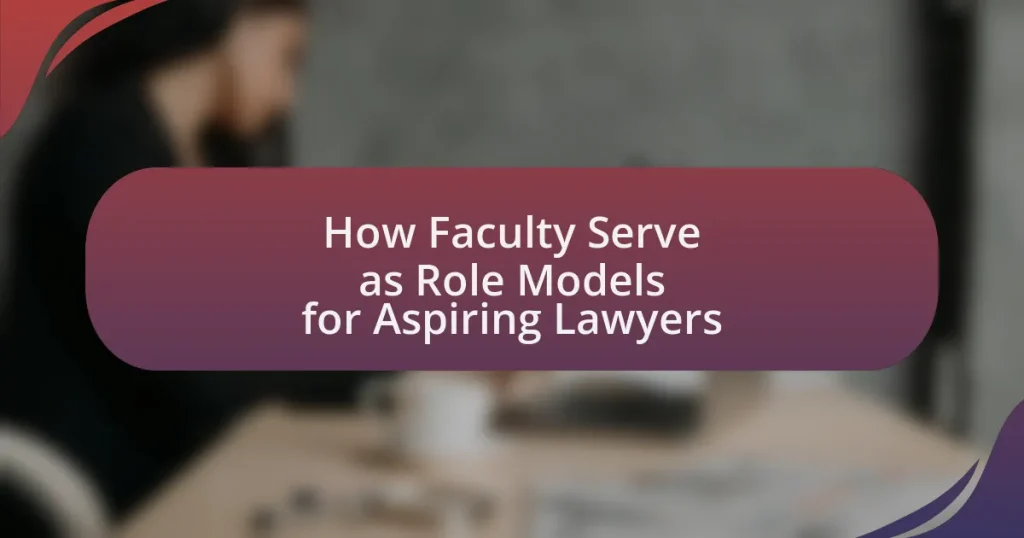Faculty members play a crucial role as role models for aspiring lawyers by exemplifying professional ethics, legal expertise, and effective advocacy skills. Their behavior and teaching methods significantly influence students’ understanding of the legal profession, shaping their values and career aspirations. Key qualities that make faculty effective role models include integrity, empathy, and approachability, which foster a supportive learning environment. Additionally, faculty mentorship programs enhance students’ academic performance and professional readiness, while feedback from faculty is essential for student development. The article explores how faculty influence students’ perceptions of the legal profession, the challenges they face in their roles, and the best practices students can adopt from their mentors.

How do faculty members influence aspiring lawyers as role models?
Faculty members influence aspiring lawyers as role models by demonstrating professional ethics, legal expertise, and effective advocacy skills. Their behavior and teaching methods set standards for students, shaping their understanding of the legal profession. For instance, faculty who engage in pro bono work exemplify a commitment to social justice, encouraging students to adopt similar values. Research indicates that mentorship from faculty significantly impacts students’ career choices and ethical decision-making, as highlighted in a study published in the Journal of Legal Education, which found that students with faculty mentors reported higher levels of confidence and professional identity.
What qualities make faculty effective role models for law students?
Effective faculty role models for law students possess qualities such as integrity, expertise, empathy, and approachability. Integrity ensures that faculty uphold ethical standards, demonstrating the importance of honesty and accountability in the legal profession. Expertise in their subject matter allows faculty to provide valuable insights and practical knowledge, which is essential for students’ understanding of complex legal concepts. Empathy enables faculty to connect with students on a personal level, fostering a supportive learning environment that encourages open dialogue and growth. Approachability encourages students to seek guidance and mentorship, which is crucial for their professional development. These qualities collectively create a positive influence on law students, shaping their values and professional identities.
How do personal experiences of faculty shape their role modeling?
Personal experiences of faculty significantly shape their role modeling by influencing their teaching methods, ethical perspectives, and interactions with students. Faculty members draw from their own academic journeys, professional challenges, and personal values, which inform how they present legal concepts and engage with aspiring lawyers. For instance, a faculty member who has faced adversity in their career may emphasize resilience and ethical decision-making in their teaching, thereby modeling these traits for students. Research indicates that faculty who share their personal narratives can enhance student engagement and foster a supportive learning environment, as seen in studies published in the Journal of Legal Education, which highlight the impact of personal storytelling on student motivation and connection to the material.
What ethical standards do faculty exemplify for aspiring lawyers?
Faculty exemplify ethical standards for aspiring lawyers by demonstrating integrity, professionalism, and a commitment to justice. These educators model ethical behavior through their adherence to legal ethics, engagement in pro bono work, and promotion of social responsibility. For instance, law professors often incorporate case studies that highlight ethical dilemmas, encouraging students to critically analyze and navigate complex moral issues in legal practice. This approach not only reinforces the importance of ethical standards but also prepares students to uphold these values in their future careers.
In what ways do faculty demonstrate professional behavior?
Faculty demonstrate professional behavior through adherence to ethical standards, effective communication, and commitment to continuous learning. They model integrity by upholding academic honesty and fostering a respectful environment, which is essential in legal education. Additionally, faculty engage in clear and constructive communication with students, providing timely feedback and guidance, which enhances the learning experience. Their dedication to ongoing professional development, such as attending legal conferences and participating in scholarly research, exemplifies a commitment to staying current in their field, thereby reinforcing their role as knowledgeable mentors for aspiring lawyers.
How do faculty handle real-world legal challenges in their teaching?
Faculty handle real-world legal challenges in their teaching by integrating practical case studies and current legal issues into their curriculum. This approach allows students to engage with real-life scenarios, enhancing their understanding of legal principles and the complexities of the law. For instance, faculty may use recent court cases or legislative changes as teaching tools, encouraging critical thinking and discussion among students. Research indicates that experiential learning, such as simulations and role-playing, further prepares students for actual legal practice by fostering skills like negotiation and advocacy. This method not only enriches the educational experience but also exemplifies the faculty’s role as mentors who bridge theoretical knowledge with practical application in the legal field.
What communication skills do faculty model for law students?
Faculty model several essential communication skills for law students, including effective oral advocacy, clear written communication, and active listening. Effective oral advocacy is demonstrated through faculty presentations and classroom discussions, where they articulate complex legal concepts clearly and persuasively. Clear written communication is modeled through the preparation of syllabi, assignments, and feedback, emphasizing the importance of clarity and precision in legal writing. Active listening is showcased during classroom interactions, where faculty engage with student questions and comments, demonstrating the value of understanding diverse perspectives. These skills are critical for success in legal practice, as they enhance students’ ability to communicate effectively with clients, colleagues, and the court.
Why is mentorship important in the legal education process?
Mentorship is crucial in the legal education process because it provides aspiring lawyers with guidance, support, and practical insights that enhance their learning experience. Through mentorship, students gain access to the knowledge and expertise of experienced legal professionals, which helps them navigate complex legal concepts and develop essential skills. Research indicates that mentorship positively impacts academic performance and career development; for instance, a study published in the Journal of Legal Education found that students with mentors reported higher levels of satisfaction and engagement in their studies. This relationship fosters a deeper understanding of the legal profession and prepares students for real-world challenges, ultimately shaping them into competent and confident lawyers.
How do faculty mentorship programs benefit aspiring lawyers?
Faculty mentorship programs benefit aspiring lawyers by providing personalized guidance, networking opportunities, and practical insights into the legal profession. These programs connect students with experienced faculty members who can share their expertise, helping students navigate academic challenges and career decisions. Research indicates that mentorship significantly enhances students’ academic performance and professional readiness, as evidenced by a study published in the Journal of Legal Education, which found that mentored students reported higher levels of satisfaction and engagement in their legal studies. Additionally, faculty mentors often facilitate internships and job placements, further bridging the gap between education and employment in the legal field.
What role does feedback from faculty play in student development?
Feedback from faculty plays a crucial role in student development by providing guidance, enhancing learning, and fostering critical thinking skills. Faculty feedback helps students identify their strengths and weaknesses, allowing them to improve their academic performance and professional competencies. Research indicates that timely and constructive feedback can significantly increase student engagement and motivation, leading to better learning outcomes. For instance, a study published in the Journal of Educational Psychology found that students who received regular feedback from instructors demonstrated higher levels of achievement and self-efficacy. This underscores the importance of faculty feedback in shaping the educational journey of aspiring lawyers.

What impact do faculty role models have on student career choices?
Faculty role models significantly influence student career choices by providing guidance, inspiration, and a tangible example of success in their respective fields. Research indicates that students who identify with faculty role models are more likely to pursue similar career paths, as these role models can shape students’ perceptions of what is achievable. For instance, a study published in the Journal of Educational Psychology found that students who had faculty mentors reported higher levels of career aspirations and were more likely to engage in activities related to their desired professions. This demonstrates that the presence of supportive faculty can enhance students’ confidence and motivation, ultimately steering them toward specific career trajectories.
How do faculty influence students’ perceptions of the legal profession?
Faculty influence students’ perceptions of the legal profession primarily through their teaching methods, professional experiences, and mentorship. Faculty members serve as role models, demonstrating the values, ethics, and practical skills necessary for success in law. Their real-world experiences and insights into the legal field shape students’ understanding of the profession, as evidenced by studies showing that students who engage with faculty who share their professional journeys tend to have a more nuanced view of legal practice. Additionally, faculty interactions in classroom discussions and feedback on assignments help mold students’ attitudes toward the legal profession, reinforcing the importance of critical thinking and ethical considerations in legal work.
What career paths do faculty encourage through their guidance?
Faculty encourage career paths in law, public policy, academia, and legal consulting through their guidance. They provide mentorship, networking opportunities, and practical insights that help students navigate these fields. For instance, faculty often share their own experiences in legal practice or academia, illustrating the diverse roles available within the legal profession. Additionally, they may facilitate internships and externships, which are critical for gaining real-world experience and understanding the demands of various legal careers. This guidance is essential for students to make informed decisions about their professional trajectories in law and related areas.
How do faculty’s professional networks benefit aspiring lawyers?
Faculty’s professional networks significantly benefit aspiring lawyers by providing access to job opportunities, mentorship, and industry insights. These networks often include connections with legal practitioners, judges, and alumni who can offer internships, clerkships, and employment after graduation. For instance, studies show that law students who engage with faculty networks are more likely to secure positions in competitive legal markets, as faculty often recommend students to their contacts. Additionally, faculty can facilitate introductions and provide guidance on navigating the legal profession, enhancing students’ chances of success in their careers.
What challenges do faculty face in serving as role models?
Faculty face several challenges in serving as role models, including balancing professional responsibilities with personal integrity. Faculty members often struggle to maintain a consistent image that aligns with their values while navigating institutional pressures and diverse student expectations. For instance, the American Bar Association emphasizes the importance of ethical behavior in legal education, which places additional scrutiny on faculty conduct. Furthermore, faculty may encounter difficulties in addressing their own biases and ensuring inclusivity, which can impact their effectiveness as role models for all students. These challenges highlight the complexity of embodying the ideals they teach while managing the realities of their professional environments.
How do faculty balance teaching responsibilities with professional practice?
Faculty balance teaching responsibilities with professional practice by integrating their real-world legal experiences into the curriculum while managing their time effectively. This dual role allows faculty to provide students with practical insights that enhance their learning experience. For instance, many law professors engage in active legal practice, which informs their teaching and keeps their knowledge current. Research indicates that faculty who maintain professional practice are better equipped to prepare students for the realities of the legal profession, as they can share firsthand experiences and case studies. This approach not only enriches the educational environment but also demonstrates to students the importance of continuous professional development in law.
What barriers exist in faculty-student relationships in law schools?
Barriers in faculty-student relationships in law schools include hierarchical structures, lack of communication, and cultural differences. Hierarchical structures often create power imbalances, making students hesitant to approach faculty for guidance or support. Lack of communication can stem from large class sizes, which limits individual interaction and personal connection. Cultural differences, including varying backgrounds and experiences, can lead to misunderstandings and discomfort in interactions, further complicating relationships. These barriers can hinder effective mentorship and the development of supportive networks essential for aspiring lawyers.

How can aspiring lawyers maximize their learning from faculty role models?
Aspiring lawyers can maximize their learning from faculty role models by actively engaging in mentorship opportunities and seeking feedback on their work. Faculty members often possess extensive legal knowledge and practical experience, which can be invaluable for students. By participating in office hours, attending faculty-led workshops, and asking insightful questions, students can gain deeper insights into legal concepts and practices. Research indicates that mentorship significantly enhances professional development; for instance, a study published in the Journal of Legal Education found that students who engaged with faculty mentors reported higher levels of satisfaction and preparedness for legal practice. Therefore, leveraging these interactions effectively allows aspiring lawyers to benefit from the expertise and guidance of their faculty role models.
What strategies can students use to engage with faculty effectively?
Students can engage with faculty effectively by actively participating in class discussions and seeking opportunities for one-on-one interactions. Engaging in class discussions demonstrates interest and allows students to showcase their understanding of the material, which can lead to deeper connections with faculty. Additionally, scheduling office hours or informal meetings provides a platform for students to ask questions, seek advice, and discuss academic or career aspirations, fostering a mentor-mentee relationship. Research indicates that students who engage with faculty outside of the classroom are more likely to succeed academically and professionally, as these interactions can lead to valuable networking opportunities and personalized guidance.
How can students seek mentorship opportunities with faculty?
Students can seek mentorship opportunities with faculty by actively engaging in academic settings, such as attending office hours, participating in class discussions, and joining faculty-led research projects. These actions demonstrate initiative and interest, making faculty more likely to offer mentorship. Research indicates that students who engage with faculty outside of the classroom are more likely to receive guidance and support, as faculty members often appreciate proactive students who seek to deepen their understanding of the subject matter.
What questions should students ask faculty to gain insights?
Students should ask faculty about their career paths and experiences in the legal field to gain insights. Questions such as “What motivated you to pursue a career in law?” and “Can you share a significant challenge you faced in your legal career and how you overcame it?” provide valuable perspectives. Additionally, inquiries like “What skills do you believe are essential for success in law?” and “How do you stay updated with changes in legal practices?” can help students understand the practical aspects of a legal career. These questions not only foster mentorship but also allow students to learn from the real-world experiences of their faculty, which is crucial for their development as aspiring lawyers.
What best practices should aspiring lawyers adopt from faculty role models?
Aspiring lawyers should adopt best practices such as effective communication, ethical decision-making, and continuous learning from faculty role models. Effective communication is crucial in law, as demonstrated by faculty who emphasize clarity and persuasion in their teaching. Ethical decision-making is modeled by faculty who uphold integrity and professionalism, reinforcing the importance of ethics in legal practice. Continuous learning is encouraged by faculty who engage in ongoing research and professional development, illustrating the necessity of staying informed about legal trends and changes. These practices are essential for success in the legal field and are exemplified by faculty through their teaching methods and professional conduct.
How can students emulate faculty’s professional conduct in their own careers?
Students can emulate faculty’s professional conduct in their own careers by observing and adopting the ethical standards, communication skills, and dedication to continuous learning demonstrated by their professors. Faculty members often exemplify professionalism through their adherence to legal ethics, which students can study and integrate into their practice. For instance, faculty frequently engage in scholarly research and contribute to legal discourse, showcasing the importance of staying informed and involved in the legal community. By participating in networking opportunities and seeking mentorship from faculty, students can further develop their professional demeanor and establish a strong foundation for their careers.
What lifelong learning habits can students develop from faculty examples?
Students can develop lifelong learning habits such as critical thinking, self-directed learning, and adaptability from faculty examples. Faculty members often demonstrate critical thinking by engaging in complex problem-solving and encouraging students to analyze various perspectives, which fosters a mindset of inquiry and reflection. Additionally, faculty exemplify self-directed learning through their continuous pursuit of knowledge, often sharing their research and professional development experiences, which motivates students to take charge of their own learning journeys. Furthermore, faculty adapt to new information and changing circumstances, showcasing the importance of flexibility in learning, which students can emulate in their own educational and professional paths.



